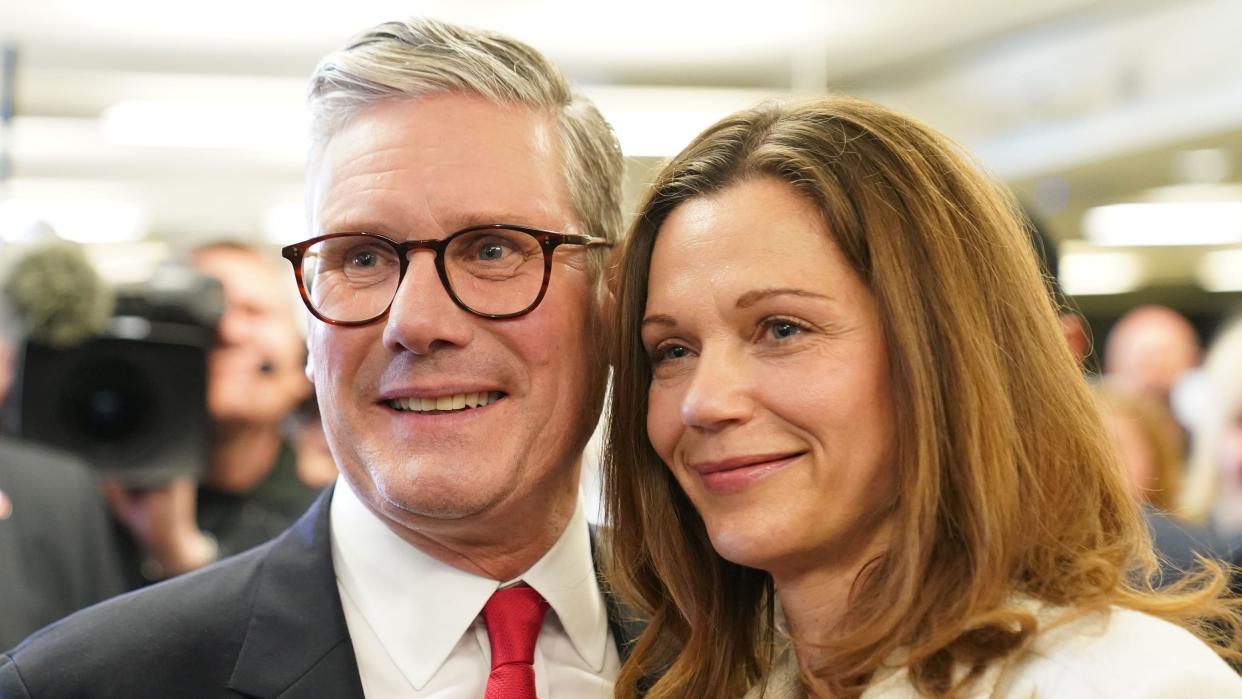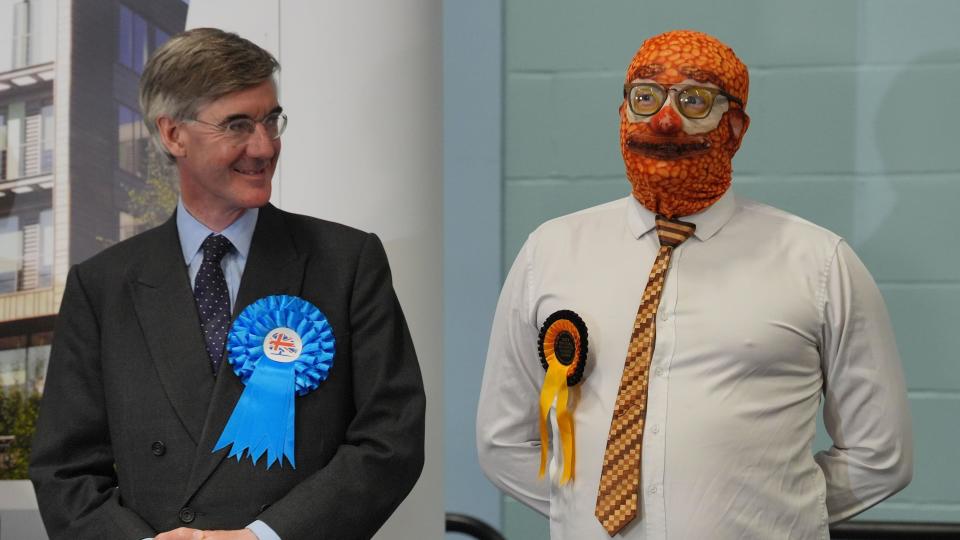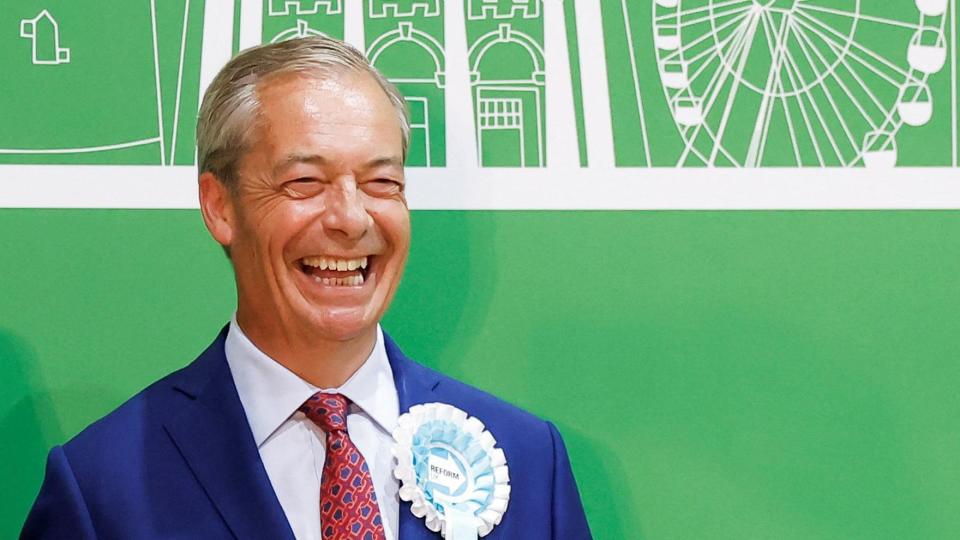UK election: What's happened and what comes next?

Sir Keir Starmer is the UK's new prime minister, after his Labour Party swept to power in a landslide general election victory.
The Conservative Party suffered a dramatic collapse after a tumultuous 14 years in power, which saw five different prime ministers run the country. It lost 250 seats over the course of a devastating night.
Rishi Sunak - the outgoing PM - accepted responsibility for the result and apologised to defeated colleagues during a brief statement outside a rainy 10 Downing Street. He said he would resign as party leader in the coming weeks.
In his first speech as prime minister after greeting dozens of jubilant Labour supporters who had lined Downing Street, Sir Keir vowed to run a "government of service" and to kick start a period of "national renewal".
"For too long we've turned a blind eye as millions slid into greater insecurity," he said. "I want to say very clearly to those people. Not this time."
"Changing a country is not like flicking a switch. The world is now a more volatile place. This will take a while, but have no doubt the work of change will begin immediately."
The result marks a stunning reversal from the 2019 election when Labour, led by the veteran left-wing politician Jeremy Corbyn, suffered its worst electoral defeat in almost a century.
On the other side, Robert Buckland, a former Conservative minister who lost his seat, described it as "electoral Armageddon" for the Tories.
It is the party's worst result in almost 200 years, with an ideological battle over its future direction expected ahead.
It's been a long night of results. Here's what it all means.
A huge Labour victory
Britain's House of Commons has 650 MPs, or members of parliament. Each of their "seats" represents a constituency, or district.
So far Labour has won 412 seats, while the Conservatives have slumped to just 121 and centrist Liberal Democrats have taken 71. Reform UK, a successor to the Brexit Party, is set to pick up four seats, as is the left-wing Green Party.
Labour's surge was partly aided by the collapse of the Scottish National Party (SNP). The party has been hit by a succession of controversies around its finances and fell to just nine seats overnight.
The expected 170-seat majority in the House of Commons for Labour is an enormous number but still short of the majority of 179 won by the party under Tony Blair in the 1997 election.
But for more perspective, the Conservatives' win in the 2019 election under Boris Johnson - seen as a very strong performance - saw them get a majority of 80 seats.
A reminder: If a party holds a majority, it means it doesn't need to rely on other parties to pass laws. The bigger the majority, the easier it is.
There were, however, a number of notable defeats for Labour to independent candidates campaigning on pro-Gaza tickets - especially in areas with large Muslim populations.
Labour has faced growing pressure over its stance to the conflict. In February, the party called for an immediate humanitarian ceasefire but critics said it was too slow to reach that position.
Centre-left parties in other Western countries were keeping a keen eye on the trend ahead of the poll, amid fear of a growing backlash from their own voters over their support for Israel.
Big names fall one by one (but some survive)
As constituencies have declared their results live on television - with all candidates lined up next to each other on stage - there were some major moments.
Perhaps the most notable was the defeat of Liz Truss. The former prime minister served just 49 days in Number 10 before being ousted by her party. She narrowly lost to Labour in the constituency of South West Norfolk, having previously held a huge 24,180 majority.
Jacob Rees-Mogg, the former Conservative business secretary and arch-Brexiteer, was another of the biggest names to suffer defeat. He lost his East Somerset and Hanham seat to Labour.
He told the BBC that he couldn't "blame anybody other than myself" for the loss but he took a "small silver lining" from the fact that the Conservatives would be "at least the official opposition" - a reference to fears they wouldn't even have that.
Grant Shapps, the defence secretary, looked rattled after losing his seat in southern England.
Leader of the House Penny Mordaunt, who ran against Rishi Sunak for the party leadership before he became prime minister, lost her seat in Portsmouth.
As the night wore on, a succession of other Conservative cabinet ministers also lost their seats, including Education Secretary Gillian Keegan, Culture Secretary Lucy Frazer and Veterans Minister Johnny Mercer.
But Jeremy Hunt, who served as chancellor - the UK equivalent of a finance minister - held on to his seat but with a much-reduced majority.
Mr Sunak also won his seat in Yorkshire with a comfortable majority of about 12,000 - but used his acceptance speech to concede and confirm his party had lost the election.
Labour lost two big names of their own. Jonathan Ashworth and Thangam Debbonaire were both expected to be a part of Keir Starmer's incoming cabinet.

A new PM within a day
Things move pretty fast in British politics - there is very little time between an election result and the installation of the new prime minister.
By mid-morning moving vans had arrived to help Rishi Sunak out of 10 Downing Street. He was then whisked away to Buckingham Palace to offer his resignation to King Charles III.
Then, just 14 hours after the initial exit poll dropped, Sir Keir was formally invited by the monarch to form the next government.
Moments later - watched by the world's media - he walked up Downing Street and addressed the nation for the first time as prime minster.
He has already started appointing a new cabinet.
Angela Rayner has been made deputy prime minister, while Rachel Reeves has become the first female chancellor.
Meanwhile David Lammy is the new foreign secretary with Yvette Cooper as home secretary.
Speaking before he handed his resignation to the King, Mr Sunak wished the new PM well.
"His successes will be all our successes, and I wish him and his family well," Mr Sunak said. "Whatever our disagreements in this campaign, he is a decent public spirited man who I respect."
So who is Keir Starmer?
He's fairly new to politics, relatively speaking.
Sir Keir started his professional life as a barrister in the 1990s, and was appointed the director of public prosecutions, the most senior criminal prosecutor in England and Wales, in 2008.
He was first elected in the Holborn and St Pancras constituency in north London in 2015, and took over leadership of Labour after the party's poor 2019 general election, pledging to start a "new era" after the left-wing leadership of Jeremy Corbyn.
Sir Keir was re-elected in the same constituency on Thursday, saying in his victory speech people were "ready for change" and promising an "end the politics of performance".
"The change begins right here because this is your democracy, your community, your future," he said. "You have voted. It's now time for us to deliver."
The Labour leader largely avoided making big pledges during the campaign.
But during his address outside Downing Street, Sir Keir said his government would strive to "rebuild" British public services such as the NHS, slash energy bills and secure the country's border.
"You have given us a clear mandate, and we will use it to deliver change," he vowed.
You can read Sir Keir's full profile here.
Nigel Farage finally becomes an MP

This election's insurgent party was Reform UK, the right-wing successor to the Brexit Party and the UK Independence Party.
Nigel Farage, its leader, finally won a seat on his eighth attempt - but his party's initial projection of 13 seats fizzled to four. That's still better than UKIP and the Brexit Party ever did, and Mr Farage has been celebrating.
The party's share of the vote looks to be about 14%.
Reform drew controversy during the campaign over offensive statements made by some of its candidates and activists.
Mr Farage will be joined in the House of Commons by former Conservative party deputy chairman Lee Anderson, Reform founder Richard Tice and Rupert Lowe.
From their new perch in parliament, the party could seek to cause trouble for the Conservatives and pick off more voters from the party's remaining base.


